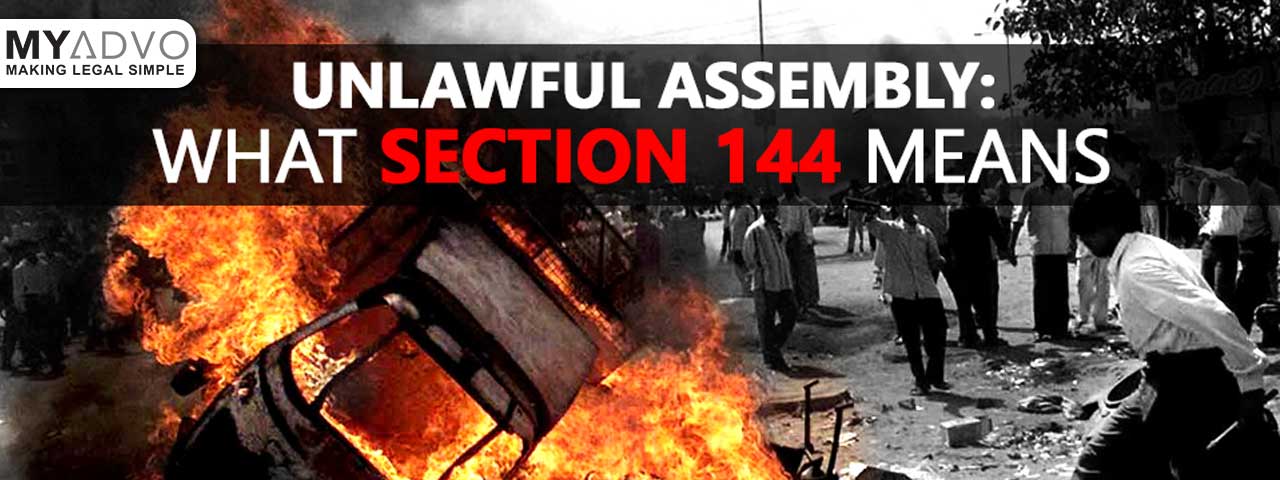The Bhima Koregaon caste violence in Maharashtra forced the State to impose Section 144 and suspend internet services in Aurangabad and bus services from Karnataka and Maharashtra. The cases of mass violence and State’s retaliation for it in the form of Section 144 have increased. However, many often end up asking the question as to what does Section 144 mean? MyAdvo has the answer for you!
The freedom of speech and movement and right to assembly are embodied in the Indian Constitution as fundamental rights. However, the right comes with an exception of unlawful assembly, which is invoked when there is an immediate need to deter a likely obstruction, injury or annoyance to any person’s life, health or safety.
What is Section 144 in India?
Section 144 means prohibition of assembly. It means a Magistrate can prevent more than 5 people from assembling in one place where the law is applied. Section 144 of the Code of Criminal Procedure, 1973 lays down the provision of an unlawful assembly which can also be invoked in case of a riot, disturbance of public tranquillity or an altercation. The police have the power to take all the necessary measures to make that possible.
Article 19(1)(a) of the Indian Constitution lays down the freedom of speech and expression and Article 19(1)(b) guarantees freedom of assembly which are, however, not absolute rights and often curtailed based on the reasonable restriction of ‘unlawful assembly’.
Section 144 is an interim remedy and can be imposed for a period of 2 months, extendable to a further period of 6 months only if the State Government think it is imperative to prevent any riot or turmoil. The Supreme Court of India has clarified the ambit of this provision affirming that albeit the provision can be invoked at the times of emergency, discretion has to be employed for invoking the section and it has to be ensured that the measure is not exercised excessively or arbitrarily.
The riots during Dera Sacha Sauda chief Gurmeet Ram Rahim Singh’s rape conviction led to the enactment of Section 144 in various states, including parts of Delhi, Haryana, Uttar Pradesh, and Punjab. Additionally, internet and messaging services were impeded as a precaution.
In Jat reservation stir, prohibitory orders were imposed under Section 144 in many districts of Haryana due to fear of riots and violence. Internet services were suspended in many states as a preventive measure.
What is the Punishment for Unlawful Assembly under Section 144?
Any person who is found to be violating Section 144, would be punishable by imprisonment up to 3 years. Additionally, anyone who prevents the police from performing their duty or breaking up an unlawful assembly would be liable to go to jail. If a person is arrested during the imposition of Section 144, he or his family member must consult a criminal lawyer to apply for bail.
A criminal lawyer can apply for a bail on your behalf and get you out of jail. MyAdvo connects you with the best criminal lawyers in India. (Email us at info@myadvo.in or call us at +919811782573)
Internet Services during Section 144
Suspending internet services has become customary with the application of Section 144. In 2017, internet services have been suspended more than 30 times. Keeping in mind the significance of internet, the Central Government has asserted that the district administration has been using the power to suspend internet and telecom arbitrarily when the unlawful assembly is imposed.
The government has come up with certain guidelines that will regulate suspension of mobile data services in India. The rules state that only the Secretary to the government or the Secretary to a state's Home Ministry can pass the order to shut down the internet in a state or across the country. With respect to restriction on internet usage, Section 69A of the Information Technology Act, 2000 which provides for blocking access to any 'computer resource', has been expounded as a restriction on only selected websites and not the entire internet services.
The internet is no longer a mere medium for exercising the freedom of speech and expression and has rather become the medium to share, receive and access information. In the present times, the internet has permuted into a platform for e-commerce, research, networking, etc. An unmitigated suspension of internet services violates the fundamental rights of innocents who play no role in starting or participating in riots or instigating violence.

